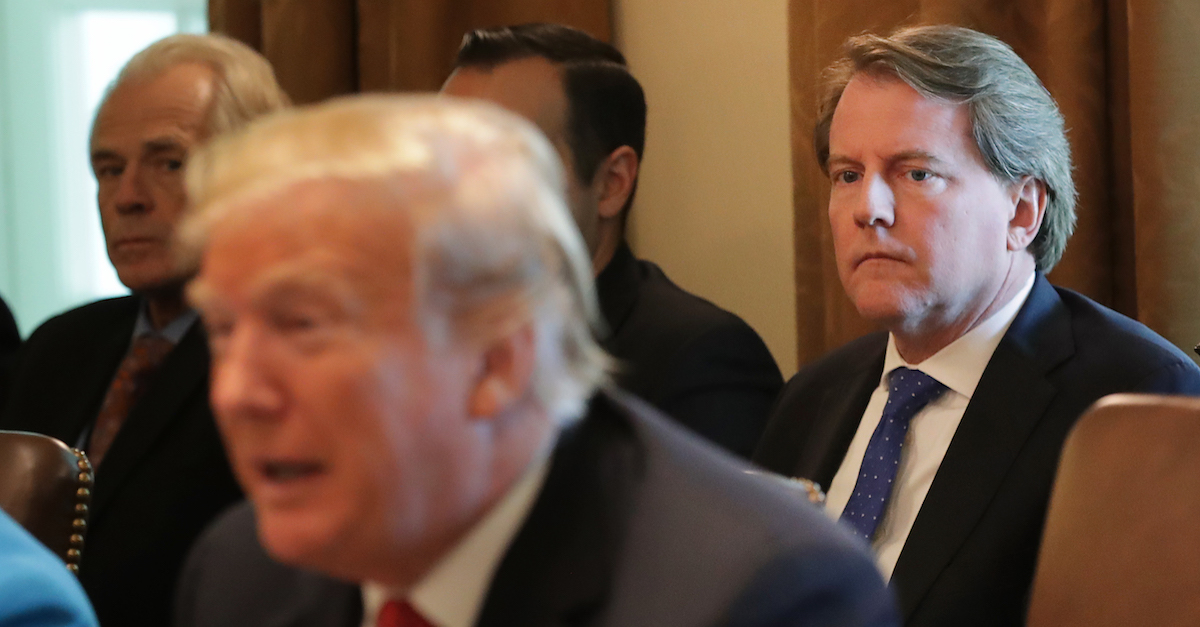
The Department of Justice (DOJ) on Friday argued that federal courts have absolutely no role in resolving disputes between the executive branch and Congress. The judges hearing those arguments appeared to be largely skeptical of the administration’s audacious claims.
Judge Thomas B. Griffith started the day’s proceedings by referring to Raines v. Bird, a 1997 Supreme Court case which effectively held that individual members of Congress do not have automatic standing to litigate the constitutionality of certain statutes simply by virtue of their being elected to Congress.
“In your view, when may Congress–or a chamber of Congress–assert an institutional injury?” Griffith asked DOJ attorney Hashim Mooppan.
The DOJ replied with a broad statement against such claims:
We don’t think they ever can, your honor, but certainly not in a case where it’s an asserted injury against the executive branch. We think that Raines reaffirmed the proposition that a dispute, an injury, only gives rise to an Article III controversy, when it’s the type of dispute that’s traditionally resolved in federal courts.
Griffith pushed back a bit: “But, I mean, the Supreme Court has said there is such a thing as institutional injury, right? You’ve got Coleman, you’ve got Arizona State Legislature…”
“Only for state legislatures,” Mooppan interjected.
“Why would that make a difference?” Griffith asked, audibly unconvinced.
To which Mooppan replied:
Because of the separation of powers problem. There are serious separation of powers concerns with having a federal court resolve an interbranch dispute and this is laid out at great detail in Raines. Raines specifies that, over history, there have been countless disputes between Congress and the president. And in none of those disputes have they been resolved through interbranch litigation over a claimed injury to official authority or power. The court went through examples–like the president not suing the Tenure of Office Act and Congress not suing over pocket vetoes…after all of that, it culminates in the conclusion of Raines and the conclusion of Raines is that while it might not be irrational to have a scheme in which courts heard those sort of disputes, it is obviously, the court is obviously the regime to obtain them.
Judge Griffith remained unconvinced.
“But here we have a rather straightforward claim of executive privilege, right?” he asked. “Doesn’t the Nixon Tapes Case invite us to resolve this dispute?”
“I don’t think so, your honor, because what Raines makes clear is it’s not sufficient that the legal issue–the merit issue–be the sort of issue that courts can resolve,” Mooppan countered–arguing that the actual factual issues aren’t important if the basic standing test cannot be met.
“In Raines, of course, the constitutionality of the Line Item Veto Act was the sort of question that courts can resolve…what Raines tells you is it’s not sufficient that the merits question be subject to judicial resolution,” Mooppan continued. “The question for standing, of course, is whether the plaintiff is the proper to bring that suit.”
To be clear, in order to sue, you need to demonstrate that you have standing:
In Lujan v. Defenders of Wildlife (90-1424), 504 U.S. 555 (1992), the Supreme Court created a three-part test to determine whether a party has standing to sue:
1. The plaintiff must have suffered an “injury in fact,” meaning that the injury is of a legally protected interest which is (a) concrete and particularized and (b) actual or imminent;
2. There must be a causal connection between the injury and the conduct brought before the court;
3. It must be likely, rather than speculative, that a favorable decision by the court will redress the injury
The DOJ argued above that it doesn’t think Congress can “ever” assert an “institutional injury.”
The Mooppan-Griffith exchange the latest judicial volley between the Trump administration and a federal court over whether or not former White House lawyer Don McGahn can be forced to comply with a duly-issued congressional subpoena seeking his testimony in the ongoing impeachment process. Two additional judges also took part in that panel hearing Friday morning.
Judge Karen Henderson was essentially a non-entity during the first round of questioning and initially didn’t ask any questions related to the overall standing claims–though she was reportedly skeptical of DOJ’s claims later on and pushed back against the argument that Congress has a meaningful remedy outside of the court system.
But we saw multiple times Judge Henderson shut down the DOJ claim that Congress has other remedies outside the court.
“It takes two,” she repeatedly said arguing back that Ds & Rs cannot cooperate so legislative remedies are outside of Dems’ ability to enforce the subpoena.
— Megan Mineiro (@MMineiro_CNS) January 3, 2020
Judge Judith Rogers, however, was particularly forceful and suspect of the administration’s claims.
“I hear you arguing this morning for an absolute rule that it really doesn’t matter who the plaintiff is–it could be the full Congress as opposed to just one house,” Rogers pressed Mooppan later on during the hearing.
“Right,” the DOJ attorney confirmed. “Because the reasoning of Raines is that interbranch disputes–disputes between one political branch and another political branch over their institutional prerogatives, with no private party to be seen anywhere–”
“So, go back to what the Framers had in mind,” the judge snappily interjected. “And having three branches of government. The hypothetical, obviously, is where one branch, arguably, is stymied in its ability to carry out a constitutional duty. There is no remedy available under our constitutional system–other than at the ballot box?”
“There is no judicial remedy,” Mooppan replied.
[Image via Chip Somodevilla/Getty Images]